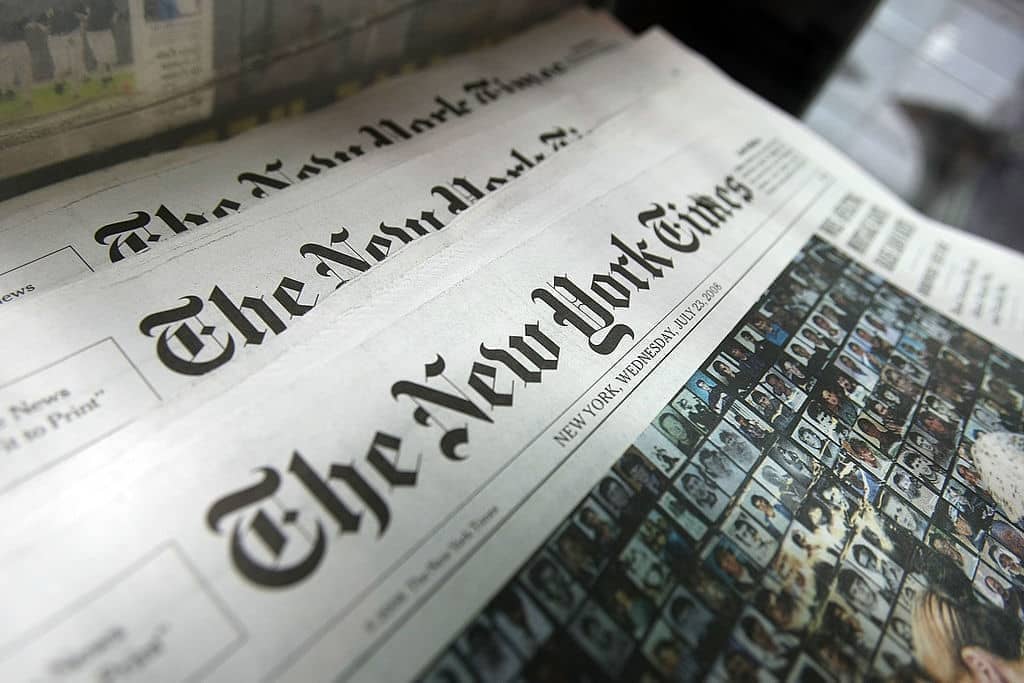The New York Times has it in for Britain. And the latest beneficiaries are the Islamists condemned by a UK government inquiry into the activist takeover of schools. I am the most senior serving Muslim parliamentarian, and have been an MP in Birmingham for over twenty years. The NYT‘s ‘Trojan Horse Affair’ podcast portrays a city that is unrecognisable to me. It is an act of utter irresponsibility.
Hamza Syed and Brian Reed present eight programmes seeking to make the case that a 2014 letter ‘Operation Trojan Horse’ detailing an activist plan to influence local schools, was a hoax. Without proof the letter is genuine, it follows there was no plot, and indeed little or no problem. Trojan Horse can then be used as an example of the ‘securitisation’ of British Muslims (as trendy academics are prone to write). Boycotting the government’s counter-extremist Prevent policy is seen as the campaigners’ next step.
The NYT intervention served as catnip for those who claim to speak for British Muslims. The Muslim Council of Britain’s (MCB) Secretary General Zara Mohamed has demanded an independent public inquiry into ‘Trojan Hoax.’ CAGE has demanded Birmingham City council institute a judicial inquiry into ‘injustice on a scale hitherto unknown.’
I know from my own experience that other voices face significant intimidation. Shamefully, before the first NYT podcast appeared, the Government Legal Department had to write to media organisations, reminding them injunctions exist against the naming of five whistleblowers who raised concerns about events in Birmingham schools in this period. These injunctions are there to protect individuals who fear abuse or harm.
The NYT intervention served as catnip for those who claim to speak for British Muslims
Opprobrium has been heaped upon those who have publicly taken a different view to the NYT podcast. Consider Shaista Gohir of the Muslim Women’s Network, whose complaints of sexism by Muslim men are dismissed as the work of a ‘native informant.’ This pejorative term is used towards people of an ethnic group who are seen as saying or doing things the establishment wishes them to.
Sonia Sodha, who critiqued the podcast in the Observer, is categorised as a reminder that ‘not all skinfolk are your kinfolk.’ My Birmingham-born parliamentary colleague Nusrat Ghani is accused of ‘Islamophobia’ when she says Brummies don’t want their children taught conspiracy theories. I, a Labour MP, am dismissed as a ‘Brown neocon.’ Is it any wonder some do not put their head above the parapet? The current contest for who speaks for British Islam is one of the dirtiest in our liberal democracy.
The NYT podcast seeks to rehabilitate Tahir Alam, who in 2015 was barred from managing or being a governor at any independent or maintained school. Alam has been a long-term fixture in Birmingham and national Islamic circles. He co-wrote the MCB’s 2007 guidance ‘Meeting the needs of Muslim pupils.’ In 2010, when serving as chair of MCB’s Education Committee he spoke warmly of the increasing number of Muslim schools, but warned:
‘Unfortunately from an Islamic point of view there are many unhealthy influences within schools.’
Who elected Tahir Alam to define the ‘Islamic point of view’? The distracting nature of searching for ‘unhealthy influences’ (again: who gets to define this?) may explain why three schools run by the Park View Academy, under Tahir Alam, were struggling in terms of governance. Failings in areas such as child protection were found in inquiries by Ofsted and the Department for Education. Members of the ‘Park View Brotherhood’ WhatsApp group shared vile homophobia and misogyny.
The NYT investigation focuses on the Trojan Horse letter because it cannot deconstruct the detail of all those enquires. Instead it criticises Rizvana Darr, the successful head teacher of Adderley School, who declined to take part. In it she is accused of ‘racist judo’ (using Islamophobia to her own advantage). Hamza Syed declares:
‘It’s a depressingly well-known move that us browns know we can make’
This type of language, towards a public servant, is appalling.
So the challenge in Birmingham is this: a small number of activists are committed to developing an education system rooted in their own interpretation of Islam, rather than an approach which recognises the importance of all faiths, but also prepares children for our wider society. They would amount to little but for their persistence, ability to articulate grievance, and skill in gaining support from the loudest voices in the activist milieu.
In 2020, the NYT had to withdraw parts of a podcast about Isis after claims in it could not be substantiated. In 2022 in Birmingham, it has blundered again, emboldening the worst elements of the community. Our city deserves better.






Comments